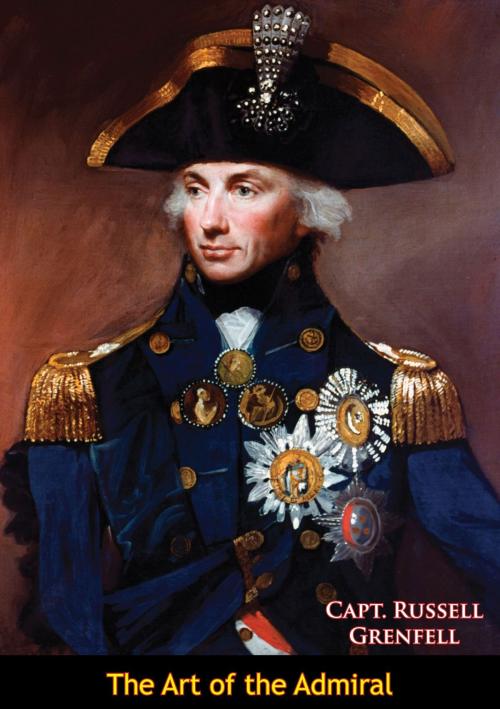| Author: | Capt. Russell Grenfell | ISBN: | 9781787202504 |
| Publisher: | Lucknow Books | Publication: | October 27, 2016 |
| Imprint: | Lucknow Books | Language: | English |
| Author: | Capt. Russell Grenfell |
| ISBN: | 9781787202504 |
| Publisher: | Lucknow Books |
| Publication: | October 27, 2016 |
| Imprint: | Lucknow Books |
| Language: | English |
This is a book about naval strategy. It is therefore of a semi-technical nature, which may seem at first sight to limit its appeal to the technical reader. I make no apology, however, for addressing myself to the layman as well as to the professional officer. It used to be thought at one time that war was the affair of the fighting forces only and that fighting men were the only ones who were competent to express an opinion on matters of strategy. The late war showed the fallacy of those ideas. It showed that modern war is an affair of whole nations and not merely of armies and navies. It also made it clear that the final responsibility for strategy lay with the civilian government. Indeed, as the war progressed, the War Cabinet found itself taking a more and more searching interest in the determination of strategy. Under these conditions, where the civilian representatives of the public play an active part in the framing of strategy, it is most desirable that the public itself should have a working knowledge of strategical principles. Though the Government may often be forced by the exigencies of the case to come to vital decisions concerning the conduct of the war without previously taking the public into its confidence, there can be no doubt that it will be greatly strengthened in making those decisions if it can feel that it has behind it an instructed public opinion on strategical matters; a public opinion which is capable of forming a just and reliable estimate of the soundness or otherwise of the strategy adopted, as it is seen to develop. In a world, therefore, where warfare is not only a possibility but seems at the moment a matter of increasing probability, it appears to be the duty of every citizen to acquaint himself with the main outlines of strategy.
This is a book about naval strategy. It is therefore of a semi-technical nature, which may seem at first sight to limit its appeal to the technical reader. I make no apology, however, for addressing myself to the layman as well as to the professional officer. It used to be thought at one time that war was the affair of the fighting forces only and that fighting men were the only ones who were competent to express an opinion on matters of strategy. The late war showed the fallacy of those ideas. It showed that modern war is an affair of whole nations and not merely of armies and navies. It also made it clear that the final responsibility for strategy lay with the civilian government. Indeed, as the war progressed, the War Cabinet found itself taking a more and more searching interest in the determination of strategy. Under these conditions, where the civilian representatives of the public play an active part in the framing of strategy, it is most desirable that the public itself should have a working knowledge of strategical principles. Though the Government may often be forced by the exigencies of the case to come to vital decisions concerning the conduct of the war without previously taking the public into its confidence, there can be no doubt that it will be greatly strengthened in making those decisions if it can feel that it has behind it an instructed public opinion on strategical matters; a public opinion which is capable of forming a just and reliable estimate of the soundness or otherwise of the strategy adopted, as it is seen to develop. In a world, therefore, where warfare is not only a possibility but seems at the moment a matter of increasing probability, it appears to be the duty of every citizen to acquaint himself with the main outlines of strategy.


![Cover of the book With The French Flying Corps [Illustrated Edition] by Capt. Russell Grenfell](https://www.kuoky.com/images/2013/january/300x300/9781782891208-VpwD_300x.jpg)
![Cover of the book 506 Parachute Infantry Regiment In Normandy Drop [Illustrated Edition] by Capt. Russell Grenfell](https://www.kuoky.com/images/2014/august/300x300/9781782893523-CRT0_300x.jpg)




![Cover of the book The Note-Book Of An Attaché - Seven Months In The War Zone [Illustrated Edition] by Capt. Russell Grenfell](https://www.kuoky.com/images/2014/august/300x300/9781782894827-qbjO_300x.jpg)

![Cover of the book With My Regiment From Aisne to La Bassée [Illustrated Edition] by Capt. Russell Grenfell](https://www.kuoky.com/images/2015/november/300x300/9781786251053-nJCX_300x.jpg)
![Cover of the book The Battle Of The Huertgen Forest [Illustrated Edition] by Capt. Russell Grenfell](https://www.kuoky.com/images/2014/august/300x300/9781782898481-IEdU_300x.jpg)


![Cover of the book With Cavalry In 1915, The British Trooper In The Trench Line, Through Second Battle Of Ypres [Illustrated Edition] by Capt. Russell Grenfell](https://www.kuoky.com/images/2012/april/300x300/9781782890737-IjQw_300x.jpg)
![Cover of the book Adventures In Propaganda; Letters From An Intelligence Officer In France [Illustrated Edition] by Capt. Russell Grenfell](https://www.kuoky.com/images/2013/march/300x300/9781782890652-UHRZ_300x.jpg)